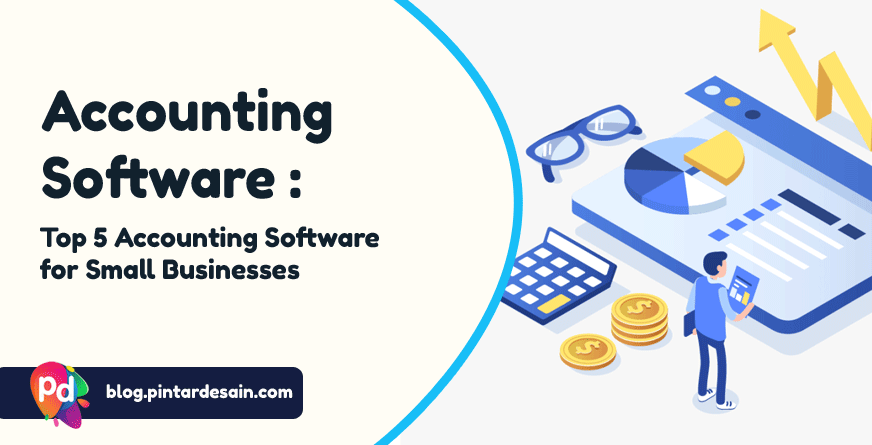Accounting software is a computer program that helps businesses and individuals manage their financial transactions and record-keeping. It allows users to input, store, organize, and analyze financial data such as income, expenses, assets, and liabilities.

Benefits Accounting software for businesses
By using the right system, businesses can produce accounts and reports automatically and in a timely manner and develop smarter business strategies. Here are eight benefits of accounting software for your business.
Simplify the process
Accounting systems may impose financial controls on users who are not accountants. This is to give meaning to the data or numbers displayed during automatic calculations. With just a little training, entrepreneurs can perform all bookkeeping operations to their standards using a computer or smartphone. Businesses do not have to pay external parties to maintain and manage the business budget.
Savings measures
Accounting and finance software can automatically perform activities such as expense calculations, administrative processes, and revenue calculations, so you don’t have to outsource financial management to outside experts. Additionally, organizations can also reduce the costs associated with printing and distributing documents. Important and sensitive company data is guaranteed to be secure in the accounting software and traceable at all times.
Financial transparency
For accountants and auditors, one of the important tasks of accounting software is to prevent and minimize repeated human errors. Calculating an inaccurate amount of money and not reporting data in a timely manner is bad for business and that’s where automated calculations with software come in.
Accurate predictions
This is one of the main benefits of accounting software, which can provide detailed data on patterns and trends in your business’ financial performance. Accounting software makes sense of dates and numbers that help you understand what expenses to cut or where to invest more. With a clear picture of your current financial situation, you can more easily strategize and allocate resources to the right places.
Productivity
If you as a business owner need to choose digital technology to improve the performance of your employees, then you need to choose accounting software. This system can handle the most complex day-to-day tasks of collecting, organizing, and analyzing data, and most importantly, it allows businesses to use money smarter.
Compliance with tax regulations
Many accounting systems automatically provide functionality for employee payroll, reporting, and tax matters. Accounting software can be a source for your tax and audit information because it keeps all important financial data transparent.
Improve customer relationships
No doubt many people will say that accounting software has nothing to do with customer service, but most accounting software can play a role in billing and prevent delays and miscommunications. This software can also be customized with the company name to make your business look more professional and credible.
Security
Financial data is valuable business information and needs to be protected to prevent it from falling into the wrong hands or being accidentally damaged. In most cases, you can create an internal security structure and assign data access rights only to interested parties.
As we enter into 2023, businesses are constantly seeking ways to streamline their accounting processes and make their financial management more efficient. One of the best ways to achieve this is by using accounting software. Accounting software can automate several financial tasks, saving businesses time and resources, while also providing real-time financial information for better decision-making.
Here are some of the best accounting software recommendations for businesses in 2023:
- QuickBooks Online:
QuickBooks Online is one of the most popular accounting software for small businesses. It is user-friendly, affordable, and offers several features, including expense tracking, invoicing, and bank reconciliation. Additionally, QuickBooks Online integrates with many third-party apps, making it a versatile option for businesses. - Xero:
Xero is an online accounting software designed for small businesses. It is known for its intuitive interface, ease of use, and flexibility. Xero offers features such as bank reconciliation, invoicing, and inventory tracking, and integrates with more than 800 third-party apps. - Zoho Books:
Zoho Books is an affordable accounting software that is suitable for small businesses. It offers features such as expense tracking, invoicing, and bank reconciliation, and can be integrated with other Zoho apps for a more comprehensive business management solution. - Wave:
Wave is a free accounting software that is ideal for freelancers and small businesses with basic accounting needs. It offers features such as invoicing, expense tracking, and receipt scanning. While the software is free, users can pay for additional features such as payroll and credit card processing. - FreshBooks:
FreshBooks is a cloud-based accounting software designed for small businesses and self-employed professionals. It offers features such as time tracking, invoicing, and project management, and integrates with third-party apps such as PayPal and Stripe.
In conclusion, accounting software is an essential tool for businesses looking to manage their finances more efficiently in 2023. The above recommendations are some of the best accounting software options available for small businesses, each with their unique features and benefits. Before choosing an accounting software, businesses should consider their specific needs and choose the option that best fits their budget and requirements.